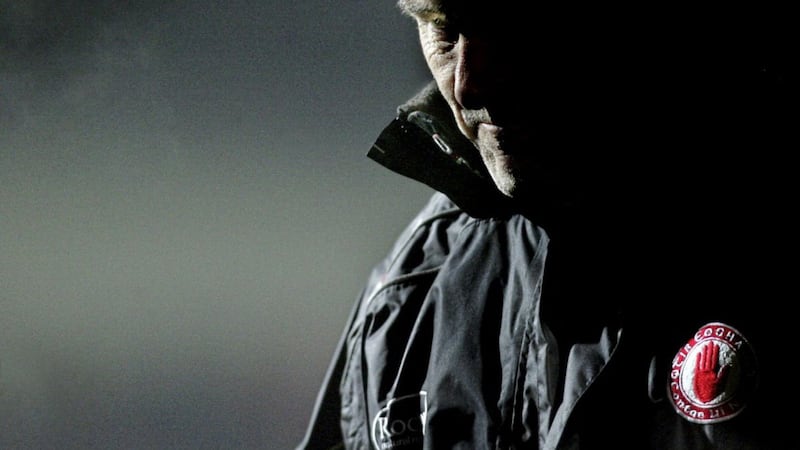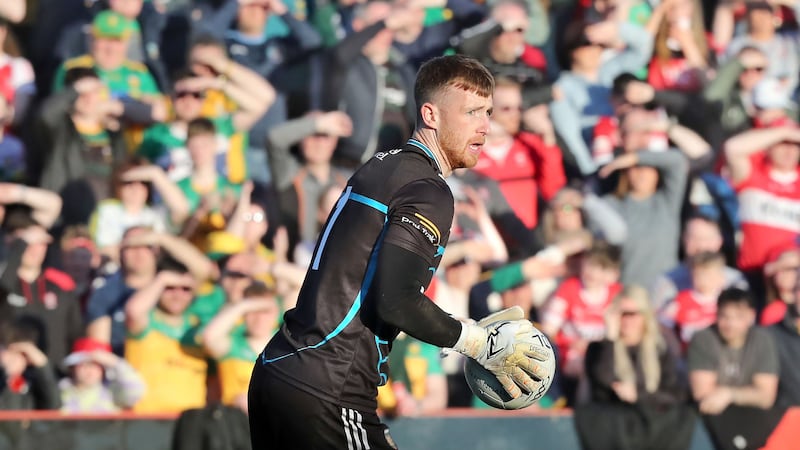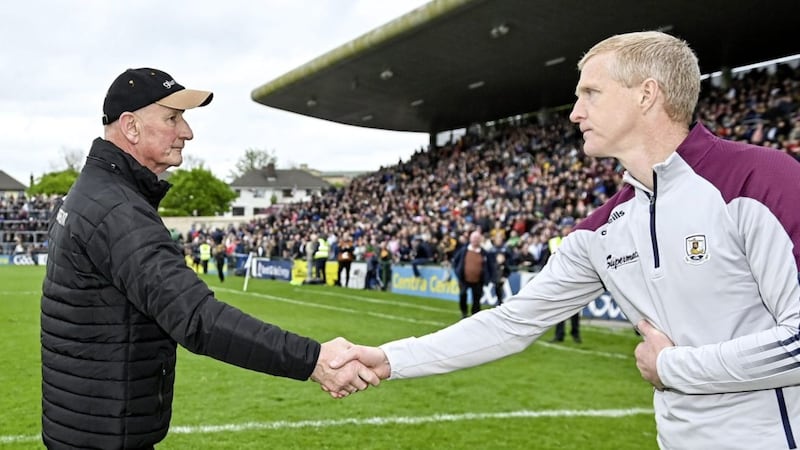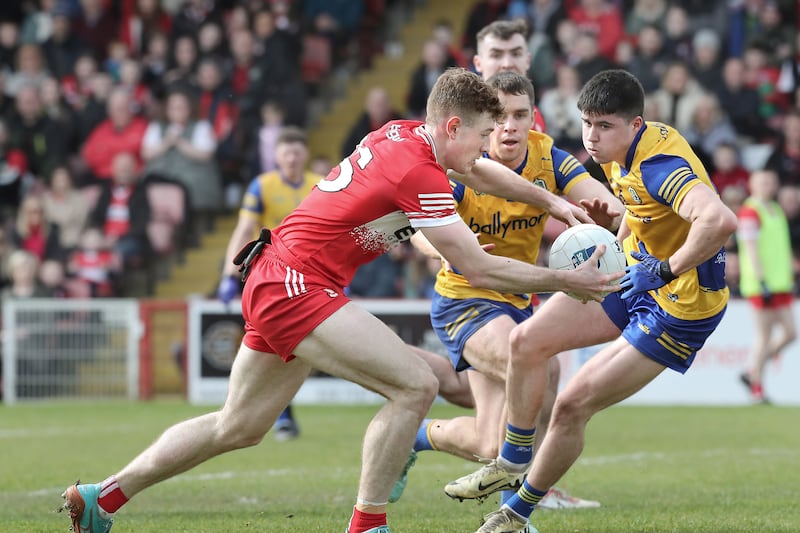SEAN Cavanagh described him as “autocratic”. “Polite, distant, brief” was Jim McGuinness’s summation of him during their sideline duels between Tyrone and Donegal.
Colm O’Rourke once characterised him as the “overseer” of Tyrone’s “cynical behaviour”.
Gavin Devlin could talk to Mickey “as well as I’d talk to my own father”.
“You know,” says Kevin ‘Hub’ Hughes, “I just think he really cared about the team. He saw us as his U12 club team.”
Some of Ryan McMenamin’s indiscretions on a football field weren’t always the easiest to defend.
But Mickey always did.
“Whenever a manager is backing you and coming out fighting for you, you’ll always appreciate it,” McMenamin says.
“He divides opinion because he is so single-minded,” says Peter Canavan.
“He’ll stick to his own principles. He’s not one to change horse in mid-stream.”
“There is a stubborn streak to Mickey but it’s probably one of his best attributes. He wouldn’t be still involved managing Tyrone teams all this time if he didn’t have that.” – Philip Jordan
THE first time ‘Hub’ Hughes encountered Mickey Harte was in St Ciaran’s Vocational School, Ballygawley.
“He was our PE teacher,” says ‘Hub’.
“There was no curriculum, back then, no dancing or anything like that, it was out playing football. From those days his competitiveness, his willingness to win, to succeed… I remember it well.
“It was always two classes - A and B. There was 10 in one class and nine in the other and Mickey would always play to make the numbers up.
“It was as if every PE class was an All-Ireland final. We learnt that from an early age – that will to win and competitiveness.
“I loved that competitiveness and the enjoyment Mickey got out of interacting with the pupils and seeing how we progressed gave him huge satisfaction.
“The way we looked at it, if there was a game there to be played, it was a game to be won.”
Years later Hughes was chasing and harassing Kerry players around Croke Park like an insatiable bloodhound.
The lust for winning was first nurtured in those PE sessions at St Ciaran’s.
“Persistence is awesome. It is absolutely awesome. It is this that turns an average performer of average ability and moulds them into a champion.” - George Zalucki. Harte quoted this to his players during the summer of 2003.
MICKEY Harte suffered too many near misses during his playing days than he’d care to remember.
He was the Tyrone minor team’s goal-getter in 1972 and despite netting in the final the young Red Hands came up short against Cork.
He also suffered a MacRory Cup final defeat in 1973 while playing for Omagh CBS against St Michael’s and experienced Ulster final heartache in 1980.
Although he enjoyed provincial successes Harte regarded his own playing career as one of unfulfilled potential.
“People said I did alright as a footballer but I have always felt I underachieved,” he wrote in his second autobiography.
“I didn’t always deliver my best in the biggest games. I was too concerned with not being able to do things instead of focusing on what I could do.”
Dromore goalkeeper Barry Campbell played with Harte at MacRory Cup level, Sigerson Cup at the ‘Ranch and county football for the best part of their careers.
Harte might have viewed his own career through a sharp, unforgiving lens but Campbell offers more generous reminders of the fleet-footed corner-forward.
“Mickey was a totally dedicated footballer. He was a leader,” says Campbell, whose final competitive game for Tyrone was the 1980 Ulster final defeat to Armagh.
“Back then, it was a different ball game. The ball was played in and you had to fight for it.
“Mickey always had those battling qualities. He never gave up.
“He was skilful, very fast and very direct. He was never one for going around corners, he always went direct and could always sniff out a goal.”
But Tyrone’s former goalkeeper ruefully adds: “Mickey and me played in a lot of finals and lost but that has probably driven him on to be the success he has been with Tyrone.”
“Mickey comes into his own when it comes to motivating a group. If there is a cause there, Mickey knows how to express it and get everyone singing off the one hymn sheet.” – Peter Canavan
BETWEEN 1982 and 1990 were known as the 'Lost Years' for Harte and his parish of Glencull.
In ’82, the St Ciaran's Ballygawley club - later renamed Errigal Ciaran - organised a round of games involving the four parishes - Glencull, Dunmoyle, Ballygawley and Garvaghey. They were effectively in-house matches for the club to get ready for the start of the league season.
In one of the games Harte (Glencull) and Brendan McCann (Dunmoyle) were sent off.
The St Ciaran's club wanted to suspend Harte from participating in the start of the league - much to the astonishment and anger of the Glencull residents.
What started out as two meaningless red cards in a pre-season challenge match morphed into an intractable rift within St Ciaran's and the wider GAA.
The Glencull parish stood their ground over the harsh treatment of Harte and St Ciaran's didn't budge an inch.
Consequently, Glencull went their own way and its members were subsequently banned from the competitive arena within the Association.
It took eight war-weary years for peace to break out in Ballygawley, thanks mainly to the soothing diplomacy of new parish priest Fr Sean Hegarty.
Harte was 28 when the fall-out occurred in the autumn of ‘82.
By the time parish rivalries were healed and the club renamed, his county days were firmly in his rear-view.
The wilderness years focused hearts and minds as the re-born club won their first county championship in ’93 and followed up with further successes in ’94 and ’97.
“If somebody thinks something [negative] of him, so be it. If he needs to be vocal about something or he feels the team aren’t getting a fair crack he’ll put that out there.” – Kevin Hughes
HARTE took over the Tyrone minors in ’91 and won a provincial title two seasons later. But it was later the first rumblings of an underage revolution were felt in the O’Neill County.
‘Hub’ Hughes, Brian McGuigan, Cormac McAnallen, Stephen O’Neill, Gavin Devlin, Owen Mulligan, Enda McGinley and Philip Jordan among them would become household names.
Tragedy, though, was never far away from the young Red Hands.
Eighteen-year-old Paul McGirr died after a collision during a provincial Championship tie in ’97, while ‘Hub’ Hughes lost his brother Paul in a road accident a few months later - between their All-Ireland semi-final game with Kerry and the subsequent replay.
In 2001, the same stretch of road - between Dungannon and Ballygawley – claimed his sister Helen.
“I joined the minor panel in ’97,” says ‘Hughes.
“He won an Ulster title in ’93 and you could see the hunger in him to keep going.
“But after Paul [McGirr] died I remember a few boys had to go and speak to him after we were defeated by Laois [in the 1997 All-Ireland final].
“We had to convince him to come back and once we won it the following year you could just see the lift it gave him.”
Hughes’s family were trying to come to terms with their own tragic loss, with ‘Hub’ remembering the support the Tyrone management team – and Harte – offered him.
“We were still young going through adolescence and into adulthood and you still needed that bit of direction; that bit of care, just somebody looking out for you.
“Especially with the two deaths in our house Mickey was always calling and asking how you were doing.
“That time with my brother Paul he gave me as much time as I wanted going into the Kerry replay.
“I played in the replay. I remember Mickey took me aside and introduced me back into the squad at training. It was emotional. It was more than a county team.”
On the field, Tyrone’s young guns were untouchable, a force of nature, winning back-to-back All-Ireland U21 titles in 2000 and 2001.
“I just knew from then, here was a man who would bring Tyrone football to the top table,” Hughes remembers.
During those U21 victories, Philip Jordan emerged as one of the most effective wing-backs in the game.
But when the Tyrone senior post became available at end of 2002, Jordan wasn’t so sure
Harte could duplicate the success he had at minor and U21.
“When the Tyrone job came up, I would have had… doubts is probably the wrong word but I wasn’t certain from a tactical point of view because we didn’t spend a lot of time on tactics,” Jordan says.
“It was all ball skills, but there were maybe subtle things along the way that we weren’t seeing. When he became senior manager, he brought in the likes of Tony Donnelly.
“The first couple of years the players weren’t aware that Tony was involved in any capacity. He was the silent man.
“The main thing about Mickey was how he prepared people for matches,” Jordan adds.
“I think when you become a successful team there is more of a challenge in it; you’re going into games as favourites and how do you make sure your players aren’t complacent. I think that’s something that Mickey has been the master at – motivating his team.
“Coming up to a match there would always be some focus points. When we played the lesser teams we usually beat them pretty heavily – and that was a sign of how well we were prepared.”
Canavan, a runner-up with Tyrone in ’95, knew better than anyone Harte’s strengths as a manager and harboured no doubts about his club-mate transferring his skills from U21 to senior level.
“Mickey had taken us to an Ulster title in the club [in 2002] and I was able to see at first hand how he was able to rally the players and bring everybody together,” Canavan says.
“What he did was play people in their natural position to try and get the best out of them.
“He kept things simple. When we didn’t have the ball in ’03 the team was working that hard it led to turning over possession. We hunted in packs and you had the hits going in.
“That wasn’t borne out of tactics or systems of play – it was borne out a necessity to put the opposition under pressure.”
Hughes admired his manager’s “tunnel vision” and almost evangelical belief in the squad winning a first All-Ireland title.
Hughes adds: “What I really noticed about Mickey in the ’08 season and it was one of his greatest strengths as a manager was his planning for other teams and counteracting their strengths.”
“He’s still got time to help people out. I had him in the school recently speaking to kids about suicide awareness. He still helps out on various fronts with the club here. That’s the other side that maybe a lot of people don’t see, the people he has influenced outside of football, the countless homes he’s been in where people have been struggling with one thing or another and he’s able to bring solace. You never hear Mickey talking about that, but it happens and it happens a lot.” - Peter Canavan
NOTHING lasts forever. Canavan retired in ’05 after claiming his second All-Ireland. Jordan walked in 2011 and ‘Hub’ held on for one more season after that.
“Mickey was very much into his faith and he was tee-total but he didn’t expect anybody else to do the same,” says ‘Hub’.
“He treated you as you were. After an Ulster final, we’d meet up the next day for beers and Mickey would always have been there and he enjoyed the craic. He wanted us to enjoy it and it brought everybody together. But when the work had to go in, it went in.”
Never again will Tyrone be blessed with such a generous clutch of great players in the same era as the ‘Noughties’.
Despite reaching All-Ireland semi-finals in 2013 and 2015 – a transitional period for the Red Hands – a magical three All-Ireland titles didn’t insulate the manager from criticism.
Some people thought the natural conclusion for Harte was 2012 when Kerry breezed past them in an All-Ireland Qualifier in Killarney.
“To walk away,” Canavan says, “would have been the easy way out, put it like that. At times you’d be thinking from his own point of view not to take away from what he has done [by staying on] but I don’t think I ever expected him to do that because he’s in it for the long haul and he has his own reasons why he wants to win another All-Ireland title.
“He’s got the stomach for the fight and as long as he’s got the stomach for the fight he’ll be able to motivate his players and get the best out of them.”
When Sean Cavanagh criticised Harte earlier this year for his autocratic leadership and failure to get the best out of some forwards in the county, it prompted Gavin Devlin to question the Moy man’s captaincy.
Jordan, in his RTE on-line column, felt Cavanagh had over-cooked his criticism.
“When I was writing my columns people in the Tyrone backroom team thought I was overly critical,” Jordan says.
“At the end of the day you want to be fit to look each other in the eye at reunions because there is that special bond.
“With some of the words Sean used weren’t particularly the best words to use. I know what Sean was saying when he described Mickey as an autocrat but it was maybe the wrong word. Mickey’s the manager… and he’s been right more than he’s been wrong.”
Jordan has also noticed subtle shifts in Harte’s managerial style over the last few seasons. When he played under him, you didn’t get a handshake when you were substituted.
“And you didn’t go looking for one either,” says Jordan.
“Now, he would shake a player’s hand after he was substituted. Small things like that.”
Regardless of what unfolds in Croke Park, Mickey Harte will be there next year, and the year after that. Building. Always building.
For over 20 years, he has faced into a scorching wind. Head first. Always head first.
To be still standing after all this time is probably the purest kind of glory there is in this life.
Remembering ‘The Lost Years’. The indefatigable Gaels of Glencull.
The pain, the crushing pain of 1997. Young Paul McGirr, lost and still present in the mind's eye.
Paul and Helen Hughes.
The joy that back-to-back All-Ireland U21 titles brought in 2000 and 2001 - and feeling invincible every time the Tyrone boys laced up their boots.
Watching 'Hub' break Kerry's will in Croke.
And the sweet music Canavan, big Sean and McGuigan composed.
Mugsy's swagger and staring into the Hill.
Horse's dancing feet.
Gormley: impassive as ever. Ricey and 'big Thunder' McGinley.
"Persistence, boys. Persistence."
Tony Donnelly was the coolest man in town, the gun-slinger who never needed to reach for his holster.
Chris Lawn grabbing Dooher and not letting go beneath the Hogan stand away from the chaotic din outside.
Michaela’s perpetual smile.
And not knowing what to do when the news broke about Cormac.
The perfect summer of '05.
The driving rain in O'Moore Park in '06.
Being upstaged by Meath the following summer.
The fairytale comeback of '08.
The summers tripped by faster than our heads could fathom.
Grappling with Donegal and beating Donegal.
Petey Harte's wondrous score in sunny Clones and big Sean's magical encore.
Meanwhile, the fresh-faced class of 2015 were cutting a dash.
They know how to time their run.
It's 2018 and Mickey Harte is still here, in all kinds of terrain. Plotting.
Still facing into that same scorching wind, undaunted.
Persistence is awesome. It is absolutely awesome.








